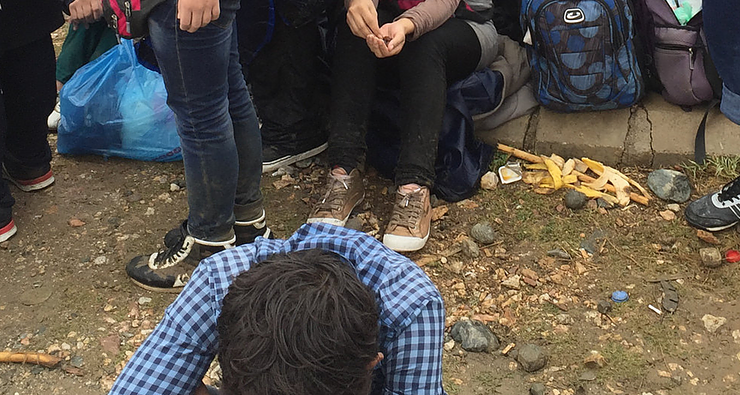
Middle East Center for Reporting and Analysis
A window into the lives of ordinary Iranians who are seeking to leave the country
Pedram Safari, an Iranian musician from Bandar Abbas, on the southern coast of Iran, froze to death in the early morning next to a small bonfire he hoped would keep him warm. The account was circulated online in mid-January, 2019. He had travelled from southern Iran, an area on the Persian Gulf filled with oil refineries, not far from the main base of the Iranian navy, to get to Europe.
Police found his frozen body in Serbia. Like hundreds of Iranians this winter he was struggling to reach northern Europe. Once they reach Serbia, there are still hurdles to cross to their destination further north. One Iranian said last fall that he deposited €2,000 (£1,780) “with a money exchange bureau to pay for his passage.” These immigrants are strung out from the coast of Calais all the way to Turkey. Many Iranians choose to leave Iran for Europe for a variety of reasons. Some also try to reach as far as Australia (recent literary prize winner Behrouz Boochani fled Iran in 2013). From political activists to those accused of criminal offenses, they leave with the hope for a better future. They come from all walks of life according to reports and the monitoring those who have made this difficult decision. Iranians have been interviewed by police in Bulgaria travelling with fake passports they purchased along the way, and stopped trying to cross the English Channel in recent months. Among the gamut of travelers, they include students, unemployed graduates, athletes, bankrupt businessmen, victims of domestic abuse, and homosexuals.
A 45-year old Iranian smuggler says that he and his colleagues smuggle about fifty people each day from the western and northwestern borders of Iran out of the country. They are mostly young me that, because they don’t want to serve in army, can’t get passports and they escape the country through illegal and undocumented methods. Sometimes there are young women among them that can’t obtain a passport.
According to Iran’s laws married women have to have permission from their husband to obtain a passport and unmarried women can obtain passport only through their consent of their father and with his written permission. According to recent reports the number of Iranian minors seeking asylum abroad is higher than the numbers from Afghanistan and Syria. The numbers are thought to have increased in the last several years since a 2015 report shed light on the motivations for Iranians fleeing to Europe.
THE CHALLENGE of Iranians seeking to move abroad has afflicted the Islamic Republic since the 1980s. Javad Ghavam-Shahidi (Jawad Qawamshahidi جواد قوام شهيدي), the secretary-general of the Supreme Council for the Affairs of Iranians Abroad said in 2014: “Seven percent of the country’s population, which is about five to six million people, lives abroad.”
A young husband and wife provide an example for those who are leaving Iran. The husband is an IT engineer and his wife is an accountant’s assistant. They work for one of the large state-run export companies in Tehran. They are concerned about the economy. “We both work full time and still can’t have a decent life.”
Wages are too low in Iran today, the married couple say. Many have seen their standard of living erode. It is difficult to to afford a livelihood for many Iranians. For instance, unemployment among youth is very high in Iran. The husband and wife say that their salaries are two months in arrears. Iran is finding it difficult to weather the sanctions that were put in place last year by the US. The authorities provide, what locals say are “empty words”.
“We are thinking of leaving the country as soon as possible. Almost all our friends and colleagues are dissatisfied with the current situation in Iran, and if they have the ability and conditions are right to immigrate, they will do it.” The wife adds: “We married three years ago and we still don’t have a child because we didn’t want our son or daughter to grow up under this poisoned system.” They look at each other and the man says both the government and weather are polluted in Tehran.
A second example is a man named Alireza from a conservative religious and government-connected family. He is a graduate in mechanical engineering. “My close friends and classmates left Iran during last two years because they had no Jobs after graduation. Thank God that my family is wealthy enough that I don’t need to be worry about income. But I have no motivation anymore to continue living in Iran. I am in daily contact with friends abroad. I will leave to Canada after Nowrouz [Iranian New Year] and from there smuggle myself to Seattle, Washington to join my friends.” He laughs and continues. “I don’t have freedom in Iran. I cannot hold my girlfriend’s hand and walk in the street.”
Continuing education and seeking employment are two related reasons that many Iranian youth prefer to leave Iran and go abroad. A member the board of one of the science and technology universities in Iran says: “Iran’s economy simply cannot provide satisfying and sufficiently remunerative job opportunities that young and educated Iranians are looking for. Our youth emigrate and after a while they lose their desire to return.”
Brain drain is disastrous for the country and it’s happening to Iran on a massive scale. Following the recent economic crisis, thousands of talented youth are estimated to have that left Iran.
The regime seeks to push back against the flight of talent by pushing an anti-western narrative, encouraging patriotism and blaming it on nefarious hands. “This is the planning and conspiracy of the West to clash with the Islamic Republic of Iran,” Iranian Supreme Leader Ayatollah Khamenei said recently.

